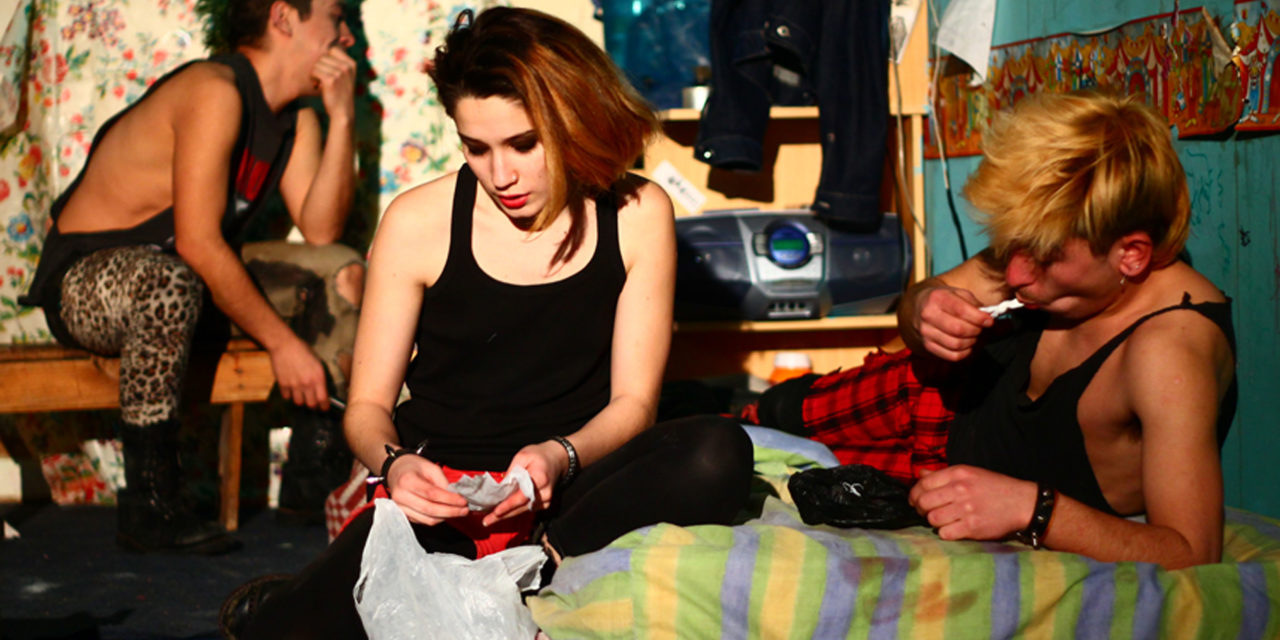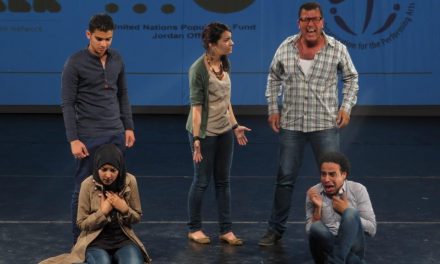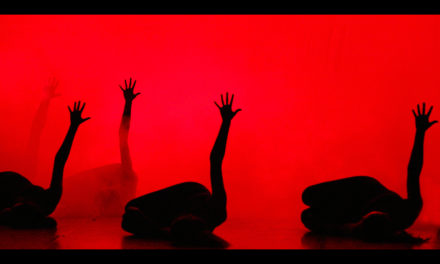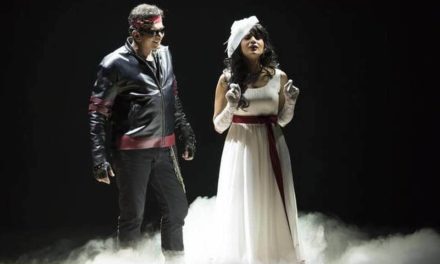Pía Gutiérrez discusses the current state of theater in Santiago, and, in this post, highlights four young theater artists and companies who are making a strong impact in Chile today. This original content is exclusive to NITEnews. This editorial is part of the series, Spotlight on Chile, which features articles, interviews, and profiles about theatre makers and companies creating work in Chile today. This is the second part of a two-part article. Click here to read the first part.
In collaboration with Nicolás Román
All of these individuals below, each different in their own right, are important by the strengths of their work, but also by their promises to maybe go far away from the traditional ways of doing theater in Chile.
Paula González
The first play I saw of Paula González, who got her academic training in the Theater School of Universidad Mayor, was in a ruka (a traditional indigenous house), located in one of the southern suburbs of the city, near where I grew up. It told the history of the women of the Mapuche (the indigenous people from the south of Chile). They were hesitant at first to tell their experiences of class, gender, and racial issues in the middle of this community, but it turned into an act of collective catharsis that involved the audience deeply.
There was a certain lucidity about these women. The modesty of their movements, wrapped in the delicacy of their daily actions, gave us a reflection about their personal lives. There was a scene that highlighted our national identity crisis, in which the state tried to make everything uniform, by excluding and repressing anything different. The circular set, combined with the simplicity of the scene and place (the ruka) made us feel at home and like strangers simultaneously.
I am talking about Ñi pú tremen which was staged in the El Bosque district in 2009, through the work of Kimen company and women of Asociación Mapuche Petu Moguelein Mahuidanche and Club of Elderly Flor de invierno, with additionally funding from CONADI (Corporación Nacional para Desarrollo Indígena).
The experience doesn’t interpret the epic of the Mapuche, like the brave resistance against Spanish Conquest, nor does it recount the strained relationship between the Mapuche community with the Chilean state in the conflicted south of the country. That said, these elements are intertwined in the memory of each of these women, and you could feel the importance of it in the atmosphere. You felt the experience of the migration from the southern communities into the city, and their childhood experiences spanning pain and happiness. All of these elements were present in their intimate testimony. The music, like a new language, allowed us passage into new feelings. Sometimes the spectators did not understand the language of the play, because it had many parts in Mapudungún, (the mapuche language), without any translation.
This first work marks González as a major author in the movement to give voice to those underrepresented. This movement shows us their daily conflicts, which condemn the unfair behavior those who rule against the indigenous in our social and political system. Also, in other plays of Gonzalez and her company, like Galvarino (2013) and Territorio descuajado (2013), there appear experimental elements in a staging that denotes her own signature and her response to the testimony of the Mapuche People.
Niño Proletario
The Niño Proletario Company (which owes its name to Osvaldo Lamborghini’s short story of the same title) began in 2005 with their first play Hambre, under the direction of Luis Guenel. After this debut, they decided to make links between the texts of La Escena de Avanzada, the artistic movement of 70s and 80s who resisted the military dictatorship through art manifestations. Hambre was based on the Diamela Eltit novel, Los vigilantes (1994). She was a member of C.A.D.A. ( the artistic collective of La Escena de Avanzada).
The Niño Proletario company is run by their director, Luis Guenel, the actors Sally Campusano and Francisco Medina, and theatrical designer Catalina Devia, who became an important aesthetic referent in their latest stagings. There is an ethical decision that is really important in the way they show the different subjects and stagings. The link with a resistance generation reconverts their sign in our days. A fragmentary theater (mainly poetic) shows us disturbances of an invisible system of control that rules over us. The human condition represented through a monologue shows us a disagreement with a political context that denies participation to its members.
In subsequent plays, the company makes different kinds of drama. Maybe they are searching for an authentic and strong theater. Along with this line, they have made works like Temporal (2008), based on Tennessee Williams play The Glass Menagerie, and their first original drama: El olivo (2009), written by Sally Campusano. In this play, the traditions of the Chilean Theater are recalled through tavern dialogues that sew pieces of folkloric works together. This play has a classic and realistic structure, related with some plays of Juan Radrigan, renowned playwright of popular tragedies from the dictatorship till now. In this work, there is a desire to show minimal histories, and it has become their most renowned work.
There is something to this group, some desire to get the voice of those who cannot speak, those of the collective imagination of the resistance. Something precarious and unpleasant is in their stagings, that has an ideological power in its aesthetic exploration. There is a desire to find the grammar of the exercise of power governing daily life.
La Resentida Company
La Resentida was born in 2007 with students from different acting schools under the leadership of their director Marco Layera. The dramatic experience proposed by the company is based on experimental stagings trying to build new languages collectively. That is the origin of Simulacro (2008), their first play. It shows a perception about Chile like a piece of territory in the south marked by the colonization. The play is about the preparation for the Chilean Independence Day celebration. The deal of simulation presents Chile preparing to celebrate an invention. A series of national symbols are confronted with an exceeding corporality that plays ironically in order to deconstruct the Independence Day. This play recognizes the logic of internal exoticism; there is something related to ‘Human Zoos’ in the characters. It shows ambitions like a cruel reflection of the Independence.
Some commotion has marked the artistic career of La Resentida, which, even with her name (resentful), is not comfortable to the traditional theater. They have participated in different tours with emergent theater companies, but the comments of the critics had been varied. By that logic, sometimes they are acclaimed and other times they have received negative reviews about their works. Personally, I recognize and admire the strength of their ideas, the intelligence of their text and the fights to be recognized culturally.
Their second project, Tratando de hacer una obra que cambie el mundo (2013) recovers charming features of their first work. In this play, a group of actors are working isolated to make a masterpiece; one play is able to change history. Hearing the news from the outside, they realize that social situations in Chile have changed, and there is not poverty anymore. These results are through a government program made in their absence. Now the progress is unbeatable, and the reality is so much better than the idea in their mind before the isolation. The artistic project turning into a crisis, the conversations about how to do theater, the disappointment about utopias, all of this is really close to Uruguayan Santiaguo Sanguinetti’s Argumento contra la existencia de vida inteligente en el ConoSur. Precisely in this vision about disaster, there is a generational point of view.
Los Contadores Auditores
I left for the end this creative couple: Felipe Olivares and Andres Rivera, both stage designers, who studied at the University of Chile. They made together: Karen: una historia sobre la gordura, La tía Carola, Cho: que coreano significa hermoso, En busca del huemul blanco and Los dinosaurios desaparecidos. Each work is a black comedy.
These artists, who found the name of their company in one of the most alienated jobs in bureaucracy: book-keeper, have shown a kitsch aesthetic in the middle of their job. They have an irreverent and mad taste, full of examples from T.V., entertainment world, some elements from Next Top Model of “wannabes,” in a constant expansion like false proclamations. They depict celebrities’ decadent lives in a way to show the domination. All of these elements are shown like excessive designs, with a lot of costumes. They ironically try to debate the serious and solemn status of performing arts, this exercise allows disrupting the position of the spectator used to seeing a dramatic or complex theater. Maybe it will be the beginning of new audiences and a new generation of authors.
Besides, they called their style: “Estética de la Peluca” (Wig Aesthetic) (Apuntes 133), this expression move the place of the director in our context. This work begins with visual elements -strongly in stage design- to overcome the other aspects of the scene and maybe, by this reason, disrupts and enchants.
There is a recognition in their projects. Their comedy offers us an intelligent laugh at social problems, and even, a laugh at the theatre itself. Long life to Los Contadores Auditores.
This post was written by the author in their personal capacity.The opinions expressed in this article are the author’s own and do not reflect the view of The Theatre Times, their staff or collaborators.
This post was written by Pía Gutiérrez.
The views expressed here belong to the author and do not necessarily reflect our views and opinions.


















